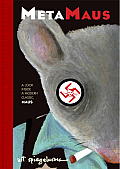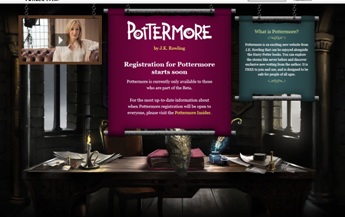The Maus That Roared
Today is the official publication date of a book that marks several major milestones in the book world. For one, it shows how far the graphic novel has come in the past quarter century. For another, it shows how far the book has come in that same period. The book we're talking about is MetaMaus: A Look Inside a Modern Classic by Art Spiegelman, a graphic novel with accompanying DVD that is a tribute to Maus, the first part of which was published in 1986. (See our review of MetaMaus, published by Pantheon Books, below.)
The book we're talking about is MetaMaus: A Look Inside a Modern Classic by Art Spiegelman, a graphic novel with accompanying DVD that is a tribute to Maus, the first part of which was published in 1986. (See our review of MetaMaus, published by Pantheon Books, below.)
The original Maus came out at a time when graphic novels were, well, novel to most readers and when many in the industry considered them unsuitable for bookstores or libraries. More than any other graphic novel, Maus changed all that. The tale of Spiegelman's father's survival of the Holocaust--whose main characters were Jewish mice and Nazi cats--was a familiar, sad story that in graphic form somehow became immediate and powerful.
Still, it took a while for strictures to loosen up. The Complete Maus, including the second part, published in 1992, eventually won a Pulitzer Prize--the sole graphic novel to do so--but only after the confused board created a special award. (Not even this writer was immune from an embarrassing brush with Maus: as paperback review editor at Publishers Weekly in 1986, I passed on reviewing Maus since we didn't review comics....)
Now, of course, graphic novels are an important part of the book world, carried in most bookstores and highly popular in libraries. And no one would decline to review a graphic novel because of its format.
MetaMaus is also striking because of the accompanying DVD--technology that didn't exist 25 years ago. The DVD contains a wealth of wonderful material, including audio recordings and transcripts of interviews with Spiegelman's father, a digitized reference copy of The Complete Maus, family documents, essays and copies of the author's notebooks and sketchbooks. It's a treasure trove of material that readers in 1986 couldn't have obtained anywhere.
So here's to the Maus that changed so much!
Happy reading! --John Mutter



 "
" This week's Further Reading highlights a new book whose author is, sadly, no longer able to participate in its release. John Moynihan wrote The Voyage of the Rose City: An Adventure at Sea (Spiegel & Grau) with no thought of publication in mind--the contents are his journals and sketches from a year spent with the Merchant Marine traveling from New Jersey to Japan.
This week's Further Reading highlights a new book whose author is, sadly, no longer able to participate in its release. John Moynihan wrote The Voyage of the Rose City: An Adventure at Sea (Spiegel & Grau) with no thought of publication in mind--the contents are his journals and sketches from a year spent with the Merchant Marine traveling from New Jersey to Japan. Everyone knows about the most famous case of a mother publishing her son's work: A Confederacy of Dunces, John Kennedy Toole's novel of New Orleans, with its unforgettable protagonist, Ignatius Reilly, won the 1981 Pulitzer Prize for Literature. But what about some other posthumously published works, the kind that also made their authors famous?
Everyone knows about the most famous case of a mother publishing her son's work: A Confederacy of Dunces, John Kennedy Toole's novel of New Orleans, with its unforgettable protagonist, Ignatius Reilly, won the 1981 Pulitzer Prize for Literature. But what about some other posthumously published works, the kind that also made their authors famous? Dream of the Red Chamber by Cao Xueqin is a Chinese version of the Romeo and Juliet story--star-crossed lovers whose meetings are constrained by the "red chamber," or women's quarters. Xueqin's novels were not published until after his death, yet this one is now considered one of the "Four Great Classical Novels of Chinese Literature," full of scope, plot and characters to delight modern readers.
Dream of the Red Chamber by Cao Xueqin is a Chinese version of the Romeo and Juliet story--star-crossed lovers whose meetings are constrained by the "red chamber," or women's quarters. Xueqin's novels were not published until after his death, yet this one is now considered one of the "Four Great Classical Novels of Chinese Literature," full of scope, plot and characters to delight modern readers. The Collected Poems of Wilfred Owen was published posthumously because Owen's death in combat came just one week before the World War I armistice. That war is the subject of his widely read and acclaimed poems, like "Dulce et Decorum Est": "My friend, you would not tell with such high zest/ To children ardent for some desperate glory,/ The old Lie; Dulce et Decorum est/ Pro patria mori."
The Collected Poems of Wilfred Owen was published posthumously because Owen's death in combat came just one week before the World War I armistice. That war is the subject of his widely read and acclaimed poems, like "Dulce et Decorum Est": "My friend, you would not tell with such high zest/ To children ardent for some desperate glory,/ The old Lie; Dulce et Decorum est/ Pro patria mori." Suite Française by Irène Némirovsky is so accomplished and so utterly different in voice from today's novels that readers may find themselves thinking they've heard about or read this book before. Némirovsky, a Russian Jew who lived in France, died at Auschwitz in 1942. Her husband sent their daughter Denise into hiding, entrusting her with her younger sister and a suitcase of their mother's work. When Denise Epstein finally read the material 50 years later, this great work got its due. --
Suite Française by Irène Némirovsky is so accomplished and so utterly different in voice from today's novels that readers may find themselves thinking they've heard about or read this book before. Némirovsky, a Russian Jew who lived in France, died at Auschwitz in 1942. Her husband sent their daughter Denise into hiding, entrusting her with her younger sister and a suitcase of their mother's work. When Denise Epstein finally read the material 50 years later, this great work got its due. -- On Thursday, Wordstock, the biggest book festival in the Pacific Northwest, opens and runs through Sunday in Portland, Ore., with most events at the Oregon Convention Center. Founded in 2005, the festival showcases "the artistic accomplishment of contemporary writers." This year's program features a variety of panels; workshops; author discussions, readings and signings; movies and documentaries; and the seventh annual Wordstock edition of Live Wire!, the radio variety show broadcast by Oregon Public Radio. Check out
On Thursday, Wordstock, the biggest book festival in the Pacific Northwest, opens and runs through Sunday in Portland, Ore., with most events at the Oregon Convention Center. Founded in 2005, the festival showcases "the artistic accomplishment of contemporary writers." This year's program features a variety of panels; workshops; author discussions, readings and signings; movies and documentaries; and the seventh annual Wordstock edition of Live Wire!, the radio variety show broadcast by Oregon Public Radio. Check out  The release of the seven Harry Potter novels as e-books, originally scheduled for this month (
The release of the seven Harry Potter novels as e-books, originally scheduled for this month (










